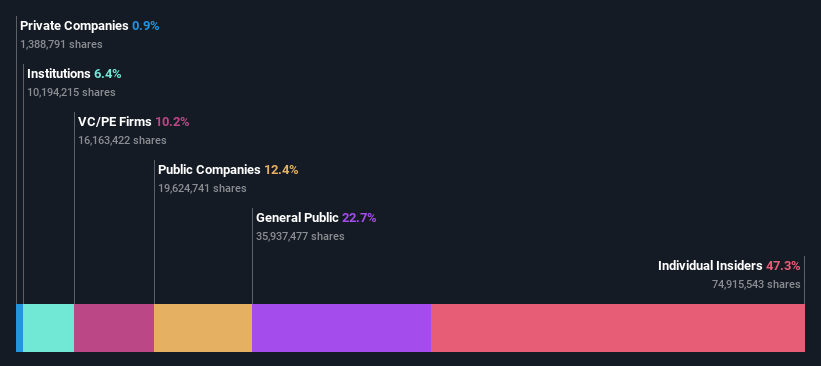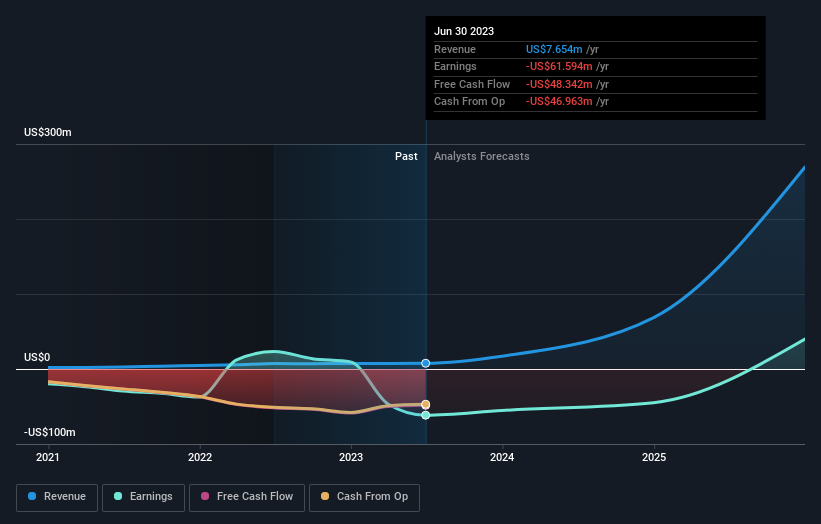Cepton, Inc. (NASDAQ:CPTN) insiders have significant skin in the game with 47% ownership
Key Insights
Significant insider control over Cepton implies vested interests in company growth
A total of 4 investors have a majority stake in the company with 56% ownership
Using data from analyst forecasts alongside ownership research, one can better assess the future performance of a company
Every investor in Cepton, Inc. (NASDAQ:CPTN) should be aware of the most powerful shareholder groups. The group holding the most number of shares in the company, around 47% to be precise, is individual insiders. Put another way, the group faces the maximum upside potential (or downside risk).
So, insiders of Cepton have a lot at stake and every decision they make on the company’s future is important to them from a financial point of view.
Let's delve deeper into each type of owner of Cepton, beginning with the chart below.
Check out our latest analysis for Cepton
What Does The Institutional Ownership Tell Us About Cepton?
Institutions typically measure themselves against a benchmark when reporting to their own investors, so they often become more enthusiastic about a stock once it's included in a major index. We would expect most companies to have some institutions on the register, especially if they are growing.
Cepton already has institutions on the share registry. Indeed, they own a respectable stake in the company. This suggests some credibility amongst professional investors. But we can't rely on that fact alone since institutions make bad investments sometimes, just like everyone does. If multiple institutions change their view on a stock at the same time, you could see the share price drop fast. It's therefore worth looking at Cepton's earnings history below. Of course, the future is what really matters.
Cepton is not owned by hedge funds. The company's CEO Jun Pei is the largest shareholder with 17% of shares outstanding. With 16% and 12% of the shares outstanding respectively, Jun Ye and Koito Manufacturing Co., Ltd. are the second and third largest shareholders.
Our research also brought to light the fact that roughly 56% of the company is controlled by the top 4 shareholders suggesting that these owners wield significant influence on the business.
While studying institutional ownership for a company can add value to your research, it is also a good practice to research analyst recommendations to get a deeper understand of a stock's expected performance. There are plenty of analysts covering the stock, so it might be worth seeing what they are forecasting, too.
Insider Ownership Of Cepton
The definition of an insider can differ slightly between different countries, but members of the board of directors always count. Company management run the business, but the CEO will answer to the board, even if he or she is a member of it.
I generally consider insider ownership to be a good thing. However, on some occasions it makes it more difficult for other shareholders to hold the board accountable for decisions.
It seems insiders own a significant proportion of Cepton, Inc.. It has a market capitalization of just US$118m, and insiders have US$56m worth of shares in their own names. We would say this shows alignment with shareholders, but it is worth noting that the company is still quite small; some insiders may have founded the business. You can click here to see if those insiders have been buying or selling.
General Public Ownership
With a 23% ownership, the general public, mostly comprising of individual investors, have some degree of sway over Cepton. While this group can't necessarily call the shots, it can certainly have a real influence on how the company is run.
Private Equity Ownership
With a stake of 10%, private equity firms could influence the Cepton board. Some investors might be encouraged by this, since private equity are sometimes able to encourage strategies that help the market see the value in the company. Alternatively, those holders might be exiting the investment after taking it public.
Public Company Ownership
Public companies currently own 12% of Cepton stock. It's hard to say for sure but this suggests they have entwined business interests. This might be a strategic stake, so it's worth watching this space for changes in ownership.
Next Steps:
It's always worth thinking about the different groups who own shares in a company. But to understand Cepton better, we need to consider many other factors. Like risks, for instance. Every company has them, and we've spotted 2 warning signs for Cepton (of which 1 is a bit concerning!) you should know about.
But ultimately it is the future, not the past, that will determine how well the owners of this business will do. Therefore we think it advisable to take a look at this free report showing whether analysts are predicting a brighter future.
NB: Figures in this article are calculated using data from the last twelve months, which refer to the 12-month period ending on the last date of the month the financial statement is dated. This may not be consistent with full year annual report figures.
Have feedback on this article? Concerned about the content? Get in touch with us directly. Alternatively, email editorial-team (at) simplywallst.com.
This article by Simply Wall St is general in nature. We provide commentary based on historical data and analyst forecasts only using an unbiased methodology and our articles are not intended to be financial advice. It does not constitute a recommendation to buy or sell any stock, and does not take account of your objectives, or your financial situation. We aim to bring you long-term focused analysis driven by fundamental data. Note that our analysis may not factor in the latest price-sensitive company announcements or qualitative material. Simply Wall St has no position in any stocks mentioned.




